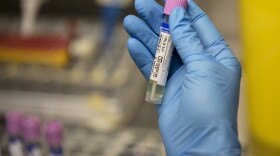New Hampshire health officials have released the state’s draft coronavirus vaccine distribution plan.
Dr. Beth Daly, chief of the state's Bureau of Infectious Disease Control, says the plan takes a phased approach to distribution, since the state will likely receive the vaccine in small allotments.
She says so far, New Hampshire has only planned part of the first phase – vaccinating over 87,000 high-risk health workers, first responders, and older people in residential care facilities. The following phases, according to national recommendations, include people of all ages with underlying health conditions, teachers and school staff, and other essential workers in high-risk settings.
Daly noted all the planning is subject to change as experts await more information on the vaccine.
"For example, we want to prioritize the elderly. However, what if the first vaccine that becomes available is shown not to be effective in elderly? Then they're not going to get that vaccine initially. So there's a lot of unknowns and we want to make sure we have all the right recommendations,” she said.
States were required to submit their plans to federal health authorities last month. New Hampshire is still awaiting comments from the CDC, but many points in its plan are consistent with national recommendations.
Many states, including New Hampshire, still don’t have a plan for paying for the vaccine’s distribution, which will rely on public and private entities. Daly said the state did receive over $800,000 for planning purposes, and the hope is that more federal funds will be on the way to aid with distribution.
Federal guidance has been released stating that the vaccine, since it is paid for by taxpayer dollars, will come at no cost to those on Medicare and Medicaid, except for a possible administration fee. Private insurance companies are encouraged to cover the cost of vaccines as well.
Daly says the state is working to make sure that everyone in New Hampshire, particularly certain populations deemed "critical" or more susceptible to COVID-19, are able to access the vaccine once it is available.
“We are going to have vaccines that are going to be distributed by the health care providers themselves, like you can go to your local pharmacy. But we also want to reach out to our vulnerable populations who might not be able to go to those locations, and we expect that we’re going to have some type of public clinics as well on the government side,” Daly said.
When it comes to tracking the distribution of the COVID-19 vaccine, a new framework is being built for that too. New Hampshire is the only state in the nation without a vaccine registry, but health officials say one is expected to be ready by December, when the first doses of the vaccine might be on their way.
“We want to emphasize that whatever vaccine gets distributed in our state will be demonstrated to be safe and effective, and that we have a plan in place for how we’re going to distribute this vaccine initially,” Daly said.






